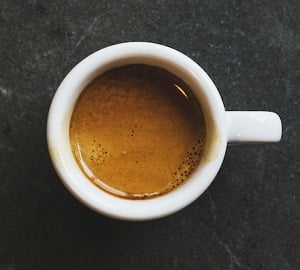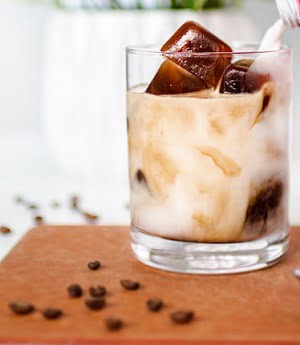The espresso shot can last in the fridge for 1-2 week. If you’ve brewed an extra shot of espresso, the best way to preserve its flavor is to store it in the fridge. This will slow the oxidation process and prevent it from going bad. If you store Espresso at room temperature the taste will go very bitter and bad in an hour.
Freshly pulled espresso shots have a thick crema layer and aromatic flavor. But that irresistible essence fades fast as time passes.
While an espresso shot can last up to a week or more when stored correctly, it is recommended to consume it within minutes.

Key Takeaways
- It’s best to drink Espresso within 5 minutes of brewing.
- Espresso doesn’t expire but its taste degrades over time.
- You can refrigerate leftover shots and use them for making Iced coffee drinks later.
- Don’t make the mistake of reheating refrigerated Espresso.
Does Espresso Shots Go Bad?
The espresso doesn’t really “go bad” in the sense of being unsafe to drink. However, the taste and texture of Espresso degrades rapidly with time.
The taste is a very subjective term. Some people notice the change in taste in five minutes, while some people can’t sense the taste even after one hour. It depends on how sensitive are your taste buds.

I was curious to know how the taste of espresso changes over time. So, I conducted an experiment and brewed 6 different shots of Espresso.
I drank the shot, which I brewed at the last within 10 to 15 seconds of brewing. This shot has a very satisfying aroma, but it was so hot that I could not fully distinguish among flavor profiles.
I drank the next shot after three minutes of brewing, it was at perfect drinking temperature and much more flavorful, and I loved that.
I drank the next shots by giving a gap of 30 minutes among them. I noticed that the flavor of Espresso gets bitter over time, and the aroma also diminishes.
The shot I had at the last was too bitter and stale and I completely hated it.
There is no exact timeline to define how long Espresso stays fresh. As the shots of Espresso never expire, it’s completely fine to drink it even after one day.
Read about 15 amazing benefits of Espresso coffee
Why does the taste of Espresso change over time?
The taste and the texture of Espresso change significantly over time because of oxidation. It gets more and more bitter over time. And the thick layer of Crema you notice over the freshly brewed shot of Espresso also gets mixed in the Espresso.
Free hydrogen ions are present in the freshly brewed shot of Espresso. These free hydrogen ions are the reason behind the acidity and the slightly sour taste of Espresso.
As time passes, more and more free hydrogen ions get oxidized, reducing the acidity and raising the pH. As the pH increases, the bitterness also increases.
Oxidation occurs at faster rates at higher temperatures and it is the main reason behind the spoiling of most food items.
Also Read: Is Espresso less acidic than coffee
You might have noticed that the slice of apple gets brown if we leave it out for some time. That’s also because of oxidation. But what happens if we store it in the fridge?

The taste of Espresso can also change due to the separation of its components over time. The denser oils and compounds settle at the cup’s bottom, while the lighter ones rise to the top. Also, the bitter Crema layer completely dissolves into the Espresso.
This leads to an inconsistent flavor experience and the formation of very heavy sediments at the bottom.
How to store Espresso properly in the Fridge?
When storing espresso in the fridge, be sure to cover it tightly with a lid. This will slow down oxidation and prevent it from absorbing flavors from other foods in the fridge.
Don’t reheat leftover espresso; it will taste burnt and ruin your coffee experience. Instead, use it to make a refreshing cold coffee drink.
Here are two ways I use leftover espresso:
- Prepare a delicious Iced Latte out of it. Mix that leftover espresso with some cold-frothed milk and sweetener of your choice, pour it over ice, and you’ve got a refreshing iced Latte drink. Or, if you’re feeling fancy, pour a shot of the leftover espresso over a scoop of vanilla ice cream for a tasty affogato dessert.
- Freeze the leftover Espresso in an ice cube box and make delicious iced coffee recipes from it.

Is it a good idea to store coffee beans or brewed coffee in the fridge? Check out our detailed article on this topic.
How long do Espresso beans last?
Freshly roasted espresso beans last 1-2 months before the flavor really starts to fade. You should brew beans within 2-4 weeks of the roast date for optimal taste.
After a month, the beans begin to oxidize and the oils break down, which makes espresso taste flat and dull.
Pre-ground espresso degrades even more quickly than whole bean since more surface area is exposed to oxygen.
how long does Espresso last in your system?
The caffeine in espresso takes about 15-45 minutes to kick in and reaches peak levels around 1 hour after consumption when it has been fully absorbed into the bloodstream.
During this time, you’ll experience increased alertness and energy.
The half-life of caffeine is about 5-6 hours. This means it takes 5-6 hours for 50% of the caffeine from your espresso to clear out of your system. And there will be a negligible amount of caffeine left in your body after 10-12 hours.
Espresso is a great way to start your day or get a boost in the afternoon, but it’s best to avoid it later in the evening, as its caffeine content can disrupt sleep.
Final thoughts
The espresso shot does not expire, and you will not get sick if you drink a day-old shot of Espresso. But it won’t be enjoyable either. If your taste buds are not sensitive, and you can enjoy a bitter shot of Espresso. Then Go On! There’s no harm in it.
It’s always better to drink your espresso shots within two to three minutes of brewing to enjoy the best flavors.
But sometimes, we forget to drink Espresso after brewing it, and sometimes we brew an extra shot by mistake.
In those cases, storing those leftover shots in the fridge and making cold coffee or milk-based coffee drinks from it is the best option.
FAQs
Does espresso go bad at room temperature?
Yes, espresso can go bad at room temperature. Over time, exposure to high temperature, air, and moisture can cause it to become stale and lose its flavor. To keep your espresso fresh, it’s best to store it in the refrigerator.
How long does an espresso keep you awake?
For most people, the alertness and wakefulness from an espresso can last anywhere from 3 to 5 hours.
However, the duration can vary depending on factors like your caffeine tolerance, metabolism, and sensitivity to caffeine.
Does Espresso Lose Caffeine Over Time?
No, The caffeine content of an espresso shot remains the same, regardless of how long you store it. Many chemical breakdowns occur in the shot of Espresso, which alters its taste over time, the Crema also dies, but the amount of caffeine always remains the same.
Related Espresso articles:





